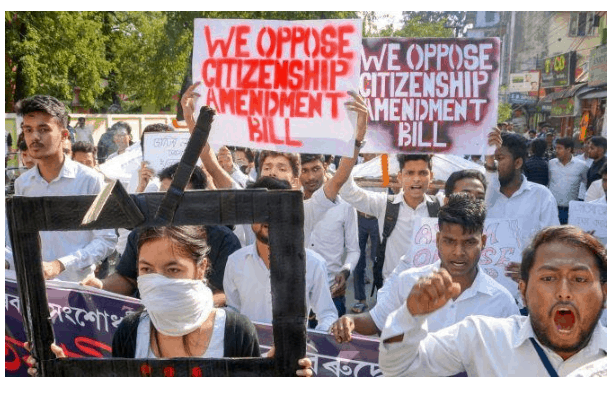UPSC Articles
POLITY
TOPIC: General Studies 2:
- Indian Constitution- historical underpinnings, evolution, features, amendments, significant provisions and basic structure
- Government policies and interventions for development in various sectors and issues arising out of their design and implementation.
NRC + CAA: Citizenship Amendment Act (CAA) & National Register of Citizens (NRC)

Daily Current Affairs IAS | UPSC Prelims and Mains Exam – 23rd December 2019
Context:
- Widespread protests against the Citizenship Amendment Act (CAA), especially in combination with the proposed all-India National Register of Citizens (NRC).
- Home Minister Amit Shah recently told Parliament that a nationwide NRC is on the cards, he distinguished it from the new citizenship law and said the NRC will have no religious filter. It is unclear if the government will bring in a fresh law to mandate a nationwide NRC
How does one prove citizenship?
- In Assam, one of the basic criteria was that the names of applicant’s family members should either be in the first NRC prepared in 1951 or in the electoral rolls up to March 24, 1971.
- Other than that, applicants also had the option to present documents such as refugee registration certificate, birth certificate, LIC policy, land and tenancy records, citizenship certificate, passport, government issued licence or certificate, bank/post office accounts, permanent residential certificate, government employment certificate, educational certificate and court records.
Why is it called an “updated” NRC?
- Witness to decades of migration from Bangladesh — formerly East Bengal and then East Pakistan — Assam already has an NRC, which was published in 1951 on the basis of that year’s Census. The only state with such a document, Assam is currently updating it to identify its citizens.
- The update, mandated and monitored by the Supreme Court, is a fallout of the Assam Accord of 1985, which sets March 24, 1971 as the cut-off date for citizenship. Those who entered Assam before that date are recognised as citizens.
Why is Assam different?
- NRC update was mandated by the Supreme Court in 2013. Assam has a history that is shaped by migration, and the protests there are against only CAA, not against NRC.
- The Assam Accord, signed by the governments of Assam and India, and the All Assam Students’ Union (AASU) and the All Assam Gana Sangram Parishad in 1985, after a six-year mass movement, essentially declared that a resident of Assam is an Indian citizen if she could prove her presence, or an ancestor’s presence, in Assam before March 25, 1971.
- That is the cutoff date for NRC, which CAA extends to December 31, 2014 to non-Muslim migrants from three countries.
To prove their or their ancestors’ presence before 1971, applicants in Assam had to produce any one of 14 possible documents:
- 1951 NRC; or
- Electoral roll(s) up to March 24, 1971; or
- Anyone of 12 other kinds of papers, such as land & tenancy records; citizenship papers; passport; Board/University certificate.
Cutoff date for a nationwide NRC:
- According to the Citizenship Act, 1955, amended in 1986, anyone born in India up to July 1, 1987 is an Indian citizen by birth. For those born on or after July 1, 1987, the law set out a fresh condition: one of the parents must be an Indian citizen. By a 2003 amendment, for any individual born on or after December 3, 2004 to be considered an Indian citizen, one parent must be an Indian citizen while the other must not be an illegal immigrant.
- This does not apply to Assam, due to the cutoff of 1971. For the rest of the country, those born outside the country after January 26, 1950, and residing in India without proper documents is an illegal immigrant.
Connecting the Dots:
- Do you think NRC + CAA are detrimental for the secular nature of the country?
- What do you think will be the way forward ?












